
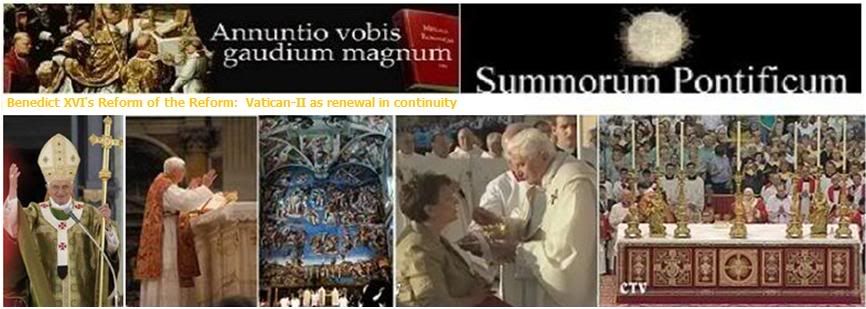 The true reform of the Ratzinger Papacy:
The true reform of the Ratzinger Papacy:
Cardinal Canizares explains how to restore
to divine worship the sense and vigor lost
by liturgy in its post-conciliar banalization
Interview by PAOLO RODARI
Translated from

January 9, 2009
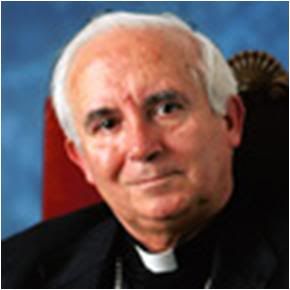
The ex-Archbishop of Toledo and Primate of Spain, Cardinal Antonio Cañizares Llovera, has headed the Vatican 'ministry for the liturgy' for just over a year now.
It is a sensitive assignment in a Pontificate like that of Benedict XVI in which the liturgy - and its 'restructuring' after 40 years of post-conciliar drift - has a central role. Just as the liturgy should be central to the life of the faithful.
The Pope re-stated this once again on Christmas Eve: As it was for the monks, so it should be for every man that "Liturgy is the first priority. Everything else will follow... Other concerns, no matter how important, must be placed second, in order to come closer to God, to allow him to enter our life and our time".
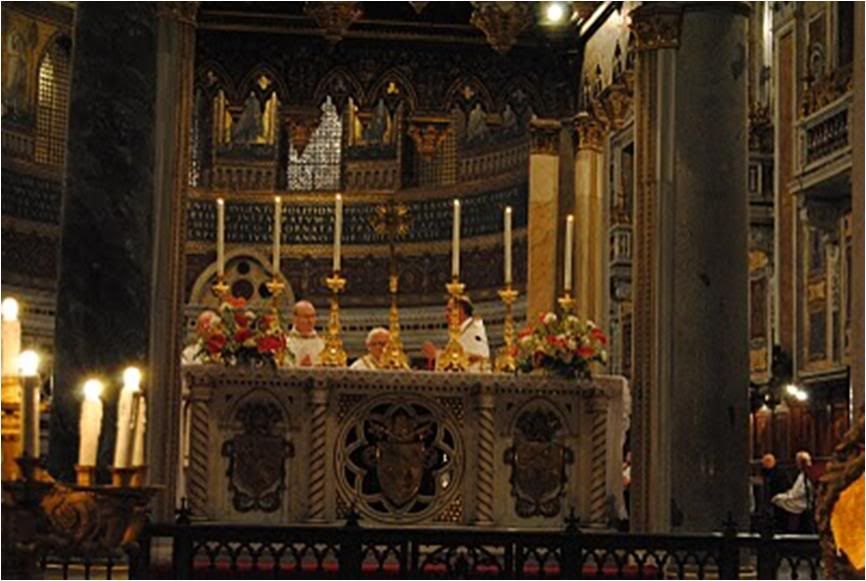
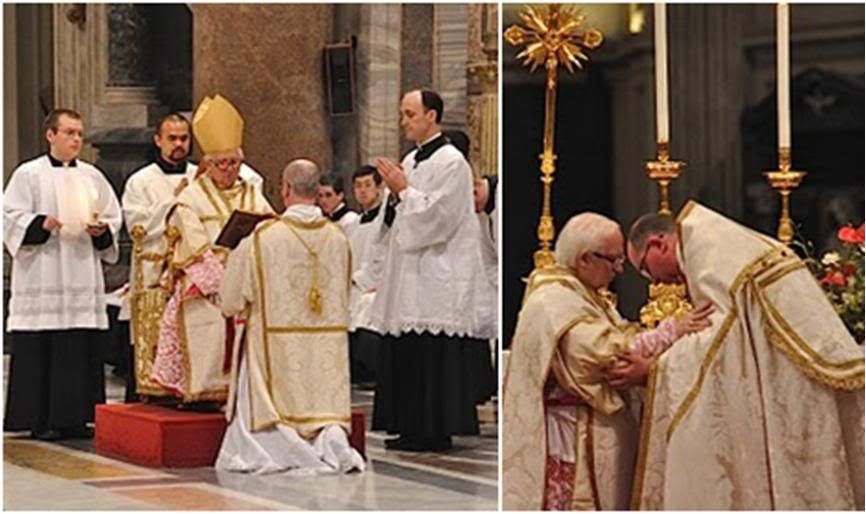 Last January 7, Cardinal Canizares celebrated a Solemn Pontifical Mass in the extraordinary form at the Basilica of St. John :ateran for the international Clergy conference sponsored by the Clergy Confraternities of the US and Australia.
Last January 7, Cardinal Canizares celebrated a Solemn Pontifical Mass in the extraordinary form at the Basilica of St. John :ateran for the international Clergy conference sponsored by the Clergy Confraternities of the US and Australia.
Cardinal Canizares has given
Il Foglio more than just a balance sheet of his first year in the Roman Curia.
What was your mission when you were named to this position?
I received the mission to fully carry out, with the indispensable help of my co-workers, the tasks assigned to the Congregation for Divine Worship and the Discipline of Sacraments by the Apostolic Constitution
Pastor Bonus of John Paul II, with regard to setting order in sacred liturgy and promoting it, particularly through the sacraments.
In the religious and cultural situation we are living, and for the priority that liturgy occupies in the life of the Church, I think that my primary assignment is to promote, with total dedication and commitment, the renewal and development of the spirit and true sense of liturgy in the consciousness and in the life of the faithful; that the liturgy may be the center and heart of life in Christian communities; that everyone - priests and faithful - consider the liturgy as substantially inseparable from our life; that we live the litrugy in full truth, and that we can live from it; that it may be, in all its ample breadth, as Vatican-II calls for, "the source and the peak' of Christian life".
After a year in the Congregation, I feel daily even more greatly the need to promote within the Church, in all the continents, a strong and rigorous liturgical force that can revive the very rich legacy of the Council and that great liturgical movement of the 19th century and the first half of the 20th - with men like Guardini, Jungmann and so many others whose ideas contributed to enrich the Church in Vatican-II.
I have no doubt that the future of the Church - and of the world - depends on it. I say this because the future of the Church and of mankind rests with God, on living in God and what comes from him. And this is what happens in the liturgy and through the liturgy.
Only a Church that lives in the truth of liturgy will be capable of evoking the only thing that can renew, transform and re-create the world: God - only God and his grace.
Liturgy, in its purest essence, is the presence of God; it is God's salvific and regenerative work, communication and participation in his merciful love, adoration, acknowledgement of God. It is the only thing that can save men.
Guardini and Jungmann - two pillars of the liturgical renewal in past decades. Figures who inspired Joseph Ratzinger in his Introduction to the spirit of liturgy. Figures who probably inspired him even in his Motu Proprio Summorum Pontificum. It has been said that the Motu Proprio represented (above everything, some would say) a hand extended to the Lefebvrians by the Pope. Is it?
It is. But the Motu proprio has a very great value in itself, for the Church and for the liturgy. Although it is not welcomed by everyone, judging from reactions that we have received and continue to receive, it is right and necessary to say that it is not a step backward nor a return to the past.
It simply acknowledges and welcomes, in all its amplitude, the treasures and the legacy of the Church's great Tradition, which has its most genuine and profound expression in liturgy.
The Church cannot allow herself to discard, forget or renounce the treasures and rich legacy of the Tradition contained in the Roman rite. It would be a betrayal and negation of herself. She cannot abandon the historical legacy of ecclesiastic liturgy, nor think of starting everything ex novo, as some would presume to do, without amputating fundamental parts of the Church herself.
Sone have chosen to understand the post-conciliar liturgical reform as a rupture, not as an organic development of tradition. In the immediate post-conciliar years, the word 'change' became almost a 'magical' word - some thought it was neceesary to change everything to the point of forgetting what was, or what is essential. Everything had to be new - new things must be introduced - things which were basically human inventions.
We cannot forget that the liturgical reform and the post-Conciliar years coincided with a cultural climate that was distinguished or dominated intensely by a concept of man as 'creator', which is difficult to reconcile with liturgy which is, above all, an act that recognizes God's priority - he has a right to it: adoration of God is a tradition that we have received and is given to us once and for always.
It is not we who 'create' the liturgy, it is not our work but God's. This idea of man as creator, leads to a secularized view of everything, in which, often, God has no place. This passion for change and discarding tradition has not been fully overcome. And that is why I think, among other things, some look at
Summorum Pontificum with distrust, and why there are those who cannot even bear to accept it.
They refuse to rediscover the great riches of the traditional Roman liturgy that we certainly cannot dismantle, nor can they even try to accept the possibility of reciprocal enrichment of the one Roman rite through its ordinary and extraordinary forms.
Summorum Pontificum has very great value that we should all appreciate. It has to do not only with the liturgy but the Church in its entirety, with what she is and what her Tradition means, without being transformed into a human institution that is constantly changing.
Obviously, it also has to do with the reading or interpretation one has of the Second Vatican Council.
When it is read or interpreted as a rupture or discontinuity, then nothing can be understood about the Council, and everything will be distorted.
That is why, as the Pope has indicated, only a 'hermeneutic of continuity' can give us a right and correct reading of the Council, to see the truth of what it says and teaches on the whole, as well as specifically for the liturgy, in the constitution
Sacrosanctum concilium on the divine liturgy, which in itself, is inseparable from the whole.
And that is why
Summorum Pontificum has the greatest value for the communion of the Church.
The Pope is fully behind a gradual but necessary process of bringing the Church closer to an authentic liturgical spirit. But he does not lack for opposition and divisions.
The Pope's great contribution, in my opinion, is that he is leading towards the truth of liturgy. With wise pedagogy, he is introducing us to the genuine 'spirit' of the liturgy, as in one of the books he wrote before he became Pope.
First of all, he is following a simple educational process that spurs getting into this 'spirit' or genuine sense of the liturgy in order to overcome the reductive concept of liturgy that has become rooted in general.
His rich and abundant teachings in this field, as Pope and before becoming Pope, like the evocative gestures and symbols that come with the liturgies he personally presides at, all tend to this objective.
To accept these gestures and teachings is our duty if we are disposed to live the liturgy in a way that corresponds to its nature, and if we do not want to lose the liturgical treasures and legacy of Tradition. Moreover, they constitute a real gift for the formation - so urgent and necessary - of the Christian population.
In such a perspective, one must look at the Motu proprio as confirming the possiblity of celebrating and participating in the rite of the Roman Missal approved by John XXIII, and which, with its modifications over the centuries, goes back to St. Gregory the Great and before him.
It is true that there are continuing difficulties for those who, in exercising something to which they have a right, celebrate or participate in the Holy Mass offered in the 'traditional' or 'extraordinary' form.
There is no reason to oppose it, much less to look at it with distrust, or label it 'pre-conciliar', or worse, 'anti-conciliar'. The reasons for such atttiudes are many and varied, but basically, they are the same reasons that have resulted in liturgical reform understood as a clean break with the past, rather than in the perspective of Tradition and the hermeneutic of continuity - which is what Vatican II meant in terms of litugical renewal.
Additionally, we cannot forget that in liturgy, we touch what is most essential in the faith and the Church, and therefore, in her history, every time liturgical changes were called for, tensions and divisions were not uncommon.
Benedict XVI's December 2005 address to the Roman Curia made it clear that the need to read Vatican II not as a discontinuity with the past but as a renewal in continuity is central to his Pontificate. What does this mean from the liturgical perspective?
It means, among other things, that we cannot fulfill the renewal of liturgy and place it at the center of Christian life if we set ourselves before it, in a clear break with Tradition that preceded us and carries this rich spring of life as a gift of God that has nourished and given life to the Christian people.
The teachings, the instructions, the gestures of Benedict XVI are all fundamental in this sense. That is why it is necessary to promote a calm and profound acquaintance with what he says - including before he became Pope - and which, in terms of liturgy, is so clearly expressed, for instance, in his apostolic exhortation
Sacramentum caritatis.
The congregation held its plenary assembly last March and presented 'propositions' to the Pope.
The assembly concerned itself primarily with Eucharistic Adoration - the Eucharist as an act of adoration and not as part of Holy Mass. We approved some conclusions that we presented to the Holy Father - they constitute a plan of action for the Congregation in the next few years, which the Holy Fahter approved and encouraged.
Everything has to do with promoting a sort of new liturgical movement which, faithful to the teachings of the Council as Benedict XVI teaches us, places liturgy in the rightful center that it merits in the life of the Church.
The 'propositions' have to do with encouraging and promoting adoration of the Lord, as the basis of the worship that we owe God, through Christian liturgy. It is inseparable from the real and substantial presence of Christ in the Eucharistic sacrament and absolutely necessary for a living Church.
Now, to put an end to liturgical abuses - which are many, unfortunately - and to correct them is not something that can come from our plenary assembly alone - it involves the liturgy itself, the life and future of the Church, and the communion of the faithful with her.
But to this end - concerning liturgical abuses and how to correct them - the CDW some years ago published a most important Instruction,
Redemptionis Sacramentum, which we must all refer to and heed. It is a most urgent duty to put an end to individualistic creativity, but rather to encourage, favor and revive the truth of liturgy, its most authentic sense, its most genuine spirit.
Nor can we forget that liturgical 'creativity' as it is often practised and understood, is a brake on liturgy itself and the cause of its secularization because it contradicts the organic nature of liturgy.
Do the propositions deal with the use of Latin?
No. They do not deal with the question of making more room for Latin in the ordinary rite, nor with publishing bilingual missals, whcih was promptly done in many places soon after Vatican II.
However, it must be remembered that the liturgical constitution
Sacrosanctum concilium does not 'repeal' Latin at all since it is the language to which the Roman rite is most linked.
What about other things like the priest's orientation...
No. We did not bring up the question of ad Orientem, nor of communion on the tongue, or other aspects that are sometimes described as 'steps backward', or conservatism, or involution.
These things - the direction the priest faces, the Crucifix in the center of the altar, receiving communion kneeling and on the tongue, the use of Gregorian chant - are important points that cannot be treated in a frivolous or superficial way, and in any case, they should be adressed with knowledge of their basis and reasons, as the Holy Father does.
These details correspond more - and are even favaorable - to the authenticity of a celebration, just like 'active participation' but only in the sense that the Council meant it, and not as popularly understood.
The important thing is that liturgy is celebrated in its truth, and with truth, in a way that favors and intensely promotes the sense and the spirit of the liturgy in the People of God so that they can live off it.
It is truly most important that Masses have and promote the sense of the sacred, of Mystery, that they can revive faith in the real presence of the Lord and in the gift of God that underlies the Mass, along with adoration, respect, veneration, contemplation, prayer, praise, thanksgiving and many other properties of genuine liturgy that have been much diluted.
When I take part or watch the Pope's liturgies which already incorporate these elements, I am increasingly convinced that they are not casual aspects but that they have an expressive and educational power in themselves and in the truth of the celebration, the lack of which is otherwise quite obvious,
[
For years, Canizares was a leading figure in the Church of Spain. He still is, even if he now lives in Rome.]
Recently, the secretary of the Spanish bishops conference, Mons. Juan Antonio Martinez Camino, declared that politicians who are public pro-abortion cannot receive communion. Do you share Camino's position? Why has Spain become the vanguard for so-called secularist policies? How should bishops react to positions that are anti-life?
Bishops, as pastors who guide and defend the people entrusted to their care, have the unavoidable duty of charity to teach and transmit, faithfully, to their flock - with wisdom, knowledge and prudence - what the faith of the Church teaches and professes, even if at some cost, even if it is against popular opinion.
The proposed new abortion legislation in Spain, when all of the regulatory measures are promulgated, is a very serious and decisive matter, about which we can neither keep silent nor hide the truth. This is what, in accordance with the Lord's command, the Church says and orders its faithful, what it demands and expects of them.
We should serve and orient the faithful with the light of truth received, which we cannot do without in moral questions that are, at times, sensitive. And we should help Catholics in public life to make decisions responsibly before God and before men, corresponding rationally to their status as children of the Church and believers in Jesus Christ.
We cannot, and must not, at the risk of being bad pastors, act on such questions with relativism, with political calculations, or with facile and subtle 'diplomacies'. The good exercise of our ministry is not, after all, at odds with - but must include - prudence, proportion, mercy, kindness and the hand held out, which must always accompany everything we do.
We are going through a difficult time in Spain - and it's not easy at all for the bishops. But I do not think that Spain is the standard-bearer nor the vanguard of secularist policies. Secularism, evident or hidden, and secularist policies are widespread almost everywhere, in some countries more than others, and even with great power.
There is obviously a force, apparently unstoppable, that is committed to introducing secularism throughout the world, or - which amounts to the same thing - to wipe out God, revealed in the human face of Jesus Christ, his only Son, from man's consciousness.
It is true that in Spain, this secularism has special connotations for its history and its very identity. Spain has been undergoing a very radical transformation of its mentality, its thinking, its criteria for judgment, even its customs and behavior, in its culture - in short, in its very character and identity.
This is manifested in a great and profound moral crisis or rupture of values, which hides a religious and social crisis, the fragmentation of the human being.
But at the same time, the roots and foundations that sustain Spain and her most genuine part come from the Christian faith - and these roots have not disappeared nor will they.
A series of laws, like those on abortion which Parliament has already passed, and other factors, are doubtless the signs of the transformation in Spain. I have always thought that we bishops, obeying God rather than men, must announce the Gospel of Jesus Christ - we cannot place anything else before him and his work - constantly and courageously announce the living God, whose glory is man himself, in everything that he gives to him - his inviolable dignity, his fundamental rights, everything that makes him human.
To announce and bear witness to him who is love, acting with charity in everything, and with charity for all, which is God's passion for man, especially for the weak, the defenseless, those who are unjustly treated. And all directed towards conversion, so that a new humanity may emerge of men made new by the novelty of the Gospel of Jesus Christ, by the way of being, thinking and doing that we see in him, who is the truth of God and man.
It means carrying out a new and decisive evangelization. And this has been the situation for some time of the Church and bishops of Spain. The work is slow and arduous, but it is bearing fruit.
I think that the bishops of Spain, precisely in affirming God and faith in Jesus Christ, are engaged in a great battle in behalf of man, of the right to life, of freedom, of those things that are indispensable to man such as family - the truth and beauty of the family based on matrimony between a man and a woman who are open to life and to love. They are fighting for the right to education of every person, for freedom of teaching, for religious freedom.
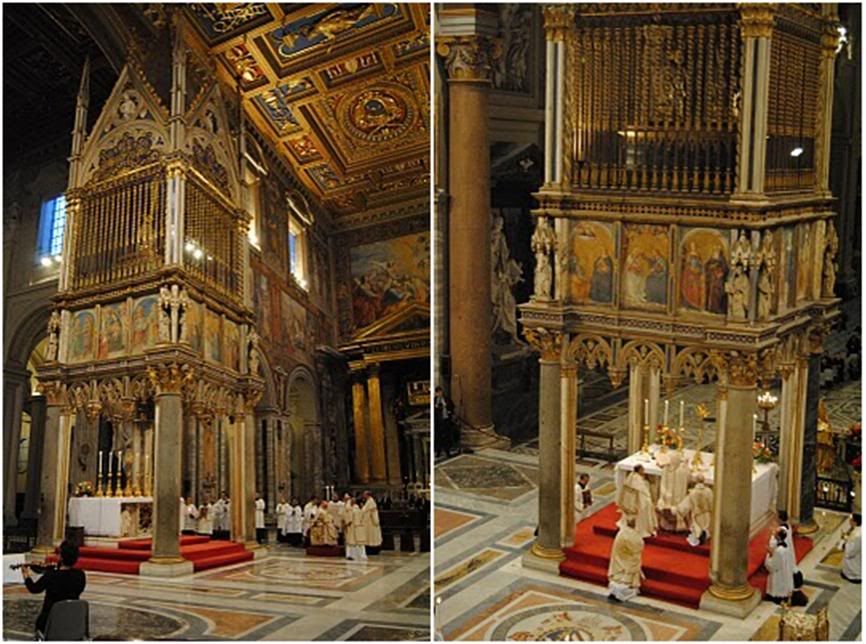 The January 7 traditional Mass at St. John Lateran.
The January 7 traditional Mass at St. John Lateran.